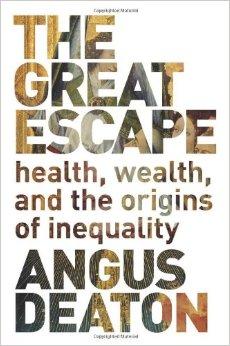As we approach the 2015 deadline for the Millennium Development Goals and contemplate what should come next, it is both timely and necessary to engage in an honest assessment of the challenges inherent to foreign aid. Debates associated with aid’s effectiveness, or lack thereof, are numerous and divisive, coalescing around a few key issues like fungibility and governance. A long literature of foreign aid skepticism questions the effectiveness of aid due to a lack of government accountability and the persistence of corruption. In light of the chronic instability and weak governance that many developing countries face, the concern that aid dollars are vulnerable to corruption or clientelist spending is, unfortunately, valid.
In his recent work, “The Great Escape,” Angus Deaton, a respected member of the “aid skeptic” school of thought, makes his case against aid as a force for good in development. For Deaton, the “aid illusion,” or the perceived power of a transfer of wealth to those in need, is a blunt instrument to address global poverty. He argues that aid may circumvent the kind of mechanisms for citizen agency and governmental accountability that an effective tax system could create. The World Bank’s Marcelo Giugale counters Deaton’s argument to abandon aid with a call to adapt it. Giugale claims that a movement toward a more decentralized aid model could foster greater aid transparency, allowing aid to flow where it’s most needed while fostering increased accountability through local agency.

In the face of such a critique, the essence of Deaton’s claim remains: after years of aid efforts amounting to billions of dollars, now is the time to look for a more evidence-based approach to development. Fortunately, the transparency movement, field research, and the age of big data make this task more feasible than ever before. To that end, some researchers are decentralizing the aid debate itself through a study of perceptions among aid recipients.
In a recent study in Uganda, AidData’s Chief Social Scientist, Dan Nielson, along with Mike Findley and Helen Milner, investigated foreign aid effectiveness using a randomized control trial. The study surveyed 3,600 Ugandans of differing socioeconomic status and vocation, assessing their view on a development project from a randomly assigned funding source - multilateral, bilateral, or NGO, with an unidentified funding source as a control, which the majority of subjects took to be the Ugandan government. These participants were then asked to demonstrate support for their preferences by signing a petition or sending an SMS.
By and large, aid was widely preferred to government projects among citizens. Although skeptics may suggest that this merely demonstrates a preference for free external aid over costly domestic taxes, the nuances of the study’s results were far more complex. Subgroup analysis revealed a significant preference for government projects among members of parliament, while citizens preferred aid. These results were especially prominent among MPs and citizens both that perceived significant corruption and clientelism. So MPs perceiving clientelism significantly preferred government projects, presumably because the resources would be easier to capture. Citizens who worried about clientelism strongly preferred aid over government spending because they believed aid was more likely to produce public goods with less corruption. In fact, among subjects that perceived little to no opportunity for clientelism, both MPs and citizens exhibited broad indifference to project funding sources.
While such findings suggest that issues of fungibility and corruption remain noticeable, it appears that aid is perceived to be a force for good, at least among the citizens in their study. Despite Deaton’s bleak assessment, Nielson, Findley and Milner conclude that it may not be time to abandon aid. Rather, the search for more effective aid and accountability continues.